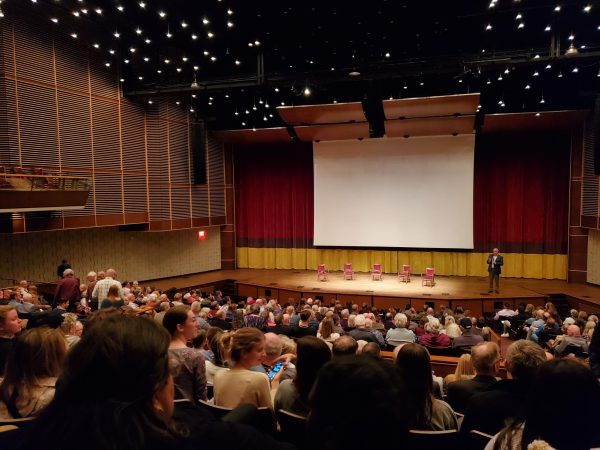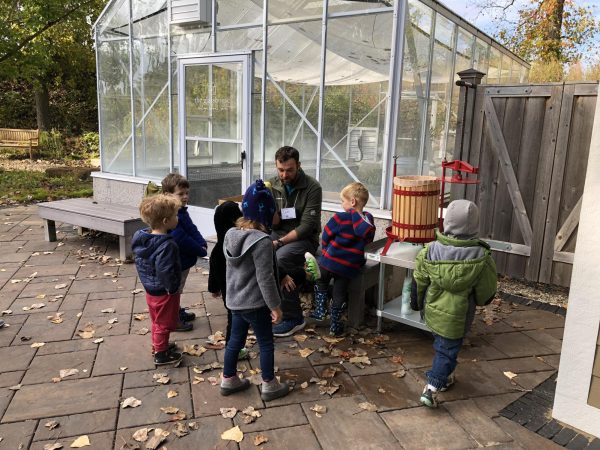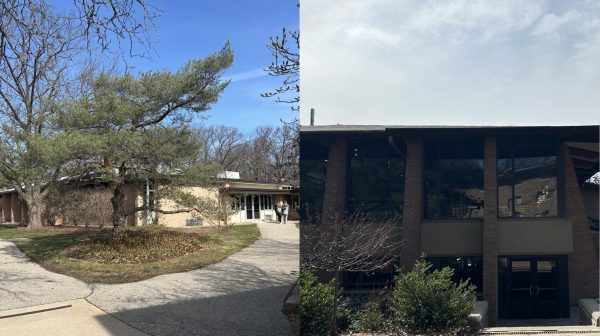Festival authors: bringing a history of conversation
For 28 years, the Festival of Faith & Writing has invited writers to add to the conversation of Christian literature. Hundreds upon hundreds of writers have come to Calvin’s campus and shared their stories.
The Early Days
Professors Jennifer Holberg and Jane Zwart, co-directors of the festival, sat for an interview with Chimes to investigate the inclusion of non-Christian authors on the rosters of festivals past and present. According to Holberg, ever since the festival in 1994, there has been an interest in expanding beyond protestant Christian authors and into the Judeo-Christian tradition. The big turning point for this aspect of the festival was in 1998, the third festival, when Elie Wiesel, a Jewish author, was invited to come as one of the plenaries.
Holberg commented on how, in the early history of the festival, having a faith conference on a Christian campus meant that it would remain very Christian. To combat this, the overseers of the festival were trying to think about the Christian tradition more broadly. Holberg continued, saying that this meant looking into those who were brought up in faith traditions that they later left.
“Within the Christian tradition, the desire was to be ecumentical,” said Zwart. “So it wasn’t just mainline protestantism, it was also people who came from the Catholic faith; people who were very interested in questions of faith, questions about belief and moral ways of being in the world, but not necessarily people who would have identified themselves as totally orthodox in their own Christianity.”
The early days were trying to figure this out. At the time of the first festivals in 1990 and 1992, there were two different spheres of booksellers, The Christian Booksellers Association (CBA) and the American Booksellers Association (ABA), and writers would be either one or the other. If a writer was a CBA writer, they would be much more the Amish romance, devotional or Christian-living book writer. And even authors like Buechner would never be sold in a CBA market, even though he identified as Christian. The question was whether one or the other of these spheres was more worthy than the other.
“If you look at the early programs, you’ll see there’s a lot of discussion about questions of how both of these markets were worthy places to publish,” said Holberg. She went on to say that these discussions led to questions such as “how can we value people who are writing for a more conventional Christian audience? How to recognize faithful writing in people who are maybe writing novels that seem like a lot of other non-Christian novels.”
That was the issue of the past, and it was one that added to the discussions that the festival is built around. The questions of the festival change over time according to what is going on in the literary world, the academy and in churches. Holberg noted how the questions of the festival have changed for the present festival:
“This year I think our program is pretty interesting because right now we are interested in things like Me Too and Black Lives Matter and trying to think a lot about diversity. What does it mean to be orthodox or evangelical, or what do all the labels mean? And also how do we welcome in all the other kinds of folks, which I think has been happening pretty solidly ever since Wiesel.”
Building up to the present
Since Wiesel, other large names of non-Christian authors have been seen in the festival programs. For example, in 2006, Salman Rushdie came.
“I think part of the reason he was a big deal,” recalled Zwart, “was because it was two of the sort of things that would make someone need to be justified as included in the Festival of Faith and Writing. So not only was he writing from a kind of deeper understanding of the Islamic tradition than the Christian tradition, but also he does not identify as a person of faith. To have both of those at once in a plenary speaker, there was a lot of discussion about that both in the festival planning committee and in the larger community.”
It was an issue that definitely needed consideration and thought, and the reasons as to why he should come outweighed the oppositions to his invitation. In the end, he was invited, and of course, was one of the highlighted attendees of the festival.
“I think the justification for doing that is,” continued Zwart, “despite the fact that he himself does not embrace any faith, he writes about these faith traditions with real insight, [and] not in way that is disdainful or dismissive; so he does contribute to that conversation even though it’s not a conversation in which he’s particularly eager to set down roots himself.”
There have been some negative reactions to non-Christian speakers at the festival, but not many. There will be those who would rather adhere to the well-trod path, than to embark on a direction that they are unfamiliar with. Resistance to the exploration of non-Christian authors has been present, even if it has been slight. Zwart recalled one such instance:
“I remember with David James Duncan, who was raised in the Seventh-day Adventist tradition, and really pushed back against it both in his fiction and in his own sort of speech against it. There were people who felt like he was being dismissive of Christ rather than being dismissive of that particular sort of cultural version of Christianity. There were some who were upset; not many, but a few.”
Zwart went on to acknowledge that there are two sides that people take. There will be those who will ask why there needs to be so many defined faiths when their sort of spirituality is perfectly sufficient. On the other side, there are those who will insist on exploring more. As Zwart puts it, “it’s a sign that you’re having good conversation.”
What it means to be Christian
The key to navigating the decisions of who to invite to festival is to remember our Christian duty toward our neighbor. Holberg explained:
“I think to be a Christian is a posture of humility and a posture of licensing; and invitation is not endorsement. And I’ve always felt like we have a really robust way of thinking about how we engage culture, and that doesn’t mean that I’m not afraid to talk to people about their ideas, and to talk about what I bring to the table.”
Both professors acknowledged that it is important to see all sides of the conversation, and to do that you need to talk with those who think differently than you do. This diversity is something that many find lacking within the academic spheres, as Holberg notes:
“One of the critiques of higher education right now is that there’s not enough diversity of opinion. And so we really want a place where, as far as we can do it, we want to do that.”
It might not be that a Christian needs to directly confront diversity in faith, or it might be that they have to confront it within their own family. Patricia Raybon and her daughter, Alana Raybon, spoke together at the 2016 festival about ways to achieve interfaith peace. Though Patricia had raised her Christian, Alana decided to become Muslim, and they used their writing as a way of having the conversation they felt they needed to have.
“We had both of them come to talk about how to have that conversation and what was hard about that conversation,” said Holberg. “This is a real-world issue; these are people we love. They are not ‘the other,’ they are our daughters and our friends.”
This is another area where Christian humility has a place to come through and allow Christians to make a way to see the world from the perspectives of other faiths.
“Part of that humility,” Zwart expounded, “is thinking about what each of us, in our own faith, have to learn from other faith traditions. Those aren’t things that need to be insights that we are afraid of leading us to conversion and to something that is not what our convictions line up with.”
As an example, Zwart noted how the views of incarnation that Amit Majmudar, a Hindu attending the 2018 festival, have afforded Zwart with insights into her own views of the incarnation of Christ. That doesn’t mean that she has taken on the Hindu beliefs surrounding incarnation, but contrasting them with her Christian beliefs has helped her deepen her own understandings of them.
Aafa Weaver, also a speaker at the 2018 festival, does similar cross examination, but with Buddhism. It’s engagement like this that encourages conversation.
“We reformed people tend to be pretty heady,” observed Holberg. “We’re a lot about doctrine and right thinking and getting all the answers right. It’s nice sometimes to have other Christian traditions, other faith traditions who are maybe more about how we live it out. All of those things have to be in conversation with one another.”
The conversation today
It is this conversation that the festival seeks to emulate. It is why so many authors are invited, why the campus strives to be so welcoming and why over 2,000 people come to our corner of Grand Rapids to talk about literature.
“The festival is not a place for proselytizing, it’s a place for conversation,” said Zwart.
While this may be true, it does not mean that some non-Christian authors do not find coming to a Christian college for a conference about faith a bit intimidating. The festival committee has found a way to anticipate these qualms.
“The letters that we send,” explained Zwart, “tend to say this is what it is in your work that makes us eager for us to hear your story, and to learn from you about how you think this way of believing and this way of creating go alongside each other. So some of that hesitation is preempted by our saying this is why we value what you’re doing.”
To further this, Holberg explains that the festival would “like to model a kind of Christianity that says, hey, we’re excited to hear ideas; we welcome you.”
She went on to say that as Christians we should not be closed off to the views that we encounter in the world. We should take what opportunities we can to interact with them and find out what we can learn from them, and perhaps what they can even learn from us.
“I do think it’s a witness,” said Holberg. “It’s a way of saying you can be a Christian who isn’t scary. You can be a Christian who actually loves your neighbor. And this is, for us, as literary people, what it means to love our neighbor; to invite them and to see the ways that they’re experiencing the world.”












